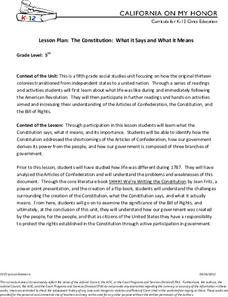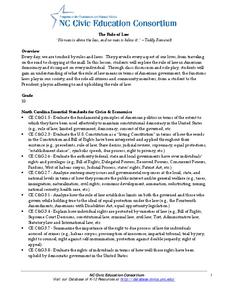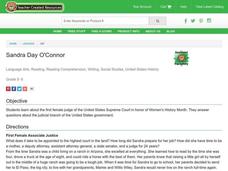Teaching Civics
Legal Ways: Extended Jurisdiction Juvenile
An amazing set of resources! Found here are several lessons that work in conjunction to help learners better understand the juvenile court system. Learners review the judicial process, discuss how juveniles are tried, and hold a class...
Curated OER
How was the Constitution Used to Organize the New Government?
How did the United States Congress determine how the new president and vice president would be named when the nation was first established? Who would provide money for the government, and how would the executive branch be organized?
iCivics
Separation of Powers
In a fun and informative simulation, your learners will act in groups as lead chefs, menu writers, and nutrition inspectors in deciding a new school lunch menu. They will then compare and contrast their experience to the interaction...
Curated OER
Lesson 2: The Constitution: Our Guiding Document
Explore the structure and content of the US Constitution in the second lesson of this five-part social studies series. A collection of activities, games, and videos complement a class reading of a document summarizing the US...
Curated OER
Woodrow The White House Mouse
Inauguration Day is January 20. Implement an entire week's worth of mini activities to help young historians become knowledgeable of the President's job, the executive branch, and the White House. The worksheets focus on research skills,...
Curated OER
The Three Branches of Government
Sixth graders discover details about the 3 branches of government. In this primary source analysis lesson, 6th graders examine documents and images from the Library of Congress to investigate the structure of the U.S. government.
Judicial Learning Center
The Judge and the Jury: Trial by Jury
Why is it so important to have a trial by jury in the American judicial system? This right is one of the hallmarks of American democracy, but it also comes with the responsibility of serving on a jury if called. Young legal scholars...
National Endowment for the Humanities
Lesson 4 James Madison: Internal Improvements Balancing Act—Federal/State and Executive/Legislative
Who has the power? The founding fathers asked the same question when the United States was formed. Learners explore issues that arose during Madison’s presidency that raised constitutional questions. Through discovery, discussion, and...
Judicial Learning Center
About Federal Judges: Qualifications of Judges
"Help Wanted: A Supreme Court Justice." What should be included in the ad? Learners ponder the question during a lively activity that asks them to examine the qualifications for various federal offices and then create job postings....
Judicial Branch of California
The Constitution: What It Says and What It Means
Learners get the chance to act as representatives to the Constitution Convention, and must decide whether or not to recommend your state ratify the new framework. After examining the Constitution line-by-line, they consider their...
Carolina K-12
The Rule of Law
What functions do laws serve in our society? Your learners will be guided through several interactive activities to address this question, and to consider the impact of rule of law in American society.
Curated OER
Building the Foundation
Students understand the purpose of the judicial branch of government. In this judiciary lesson, students participate in exercises to understand how the court system works. Students complete activity sheets to develop understanding of...
Heritage Foundation
The House of Representatives
The House of Representatives has a lot of responsibility in the United States government. But how did it all begin, and why is it the way it is now? A comprehensive lesson answers all of these questions about the US Constitution and...
Curated OER
You and the Judicial System
Students explore how the structure of the state and federal judicial systems affect them. They select an appropriate media and create a presentation on the structure of the judicial system, the criminal judicial system and a guide to the...
Curated OER
Sandra Day O'Connor
No unit on important women in history would be complete without a instructional activity on Sandra Day O'Connor. After reading background information about the first female Supreme Court justice, middle schoolers engage in several...
Youth Outreach
Connecting the Separate Powers
Scholars demonstrate what they know about the separation of powers through role play. Two individuals act out a skit as the remaining class members discuss and decide whether the interaction they observed is an appropriate example of the...
iCivics
The Road to Civil Rights
Here is a fantastic resource on the civil rights movement! It includes reading materials and worksheets, and particularly highlights major legislation and the role of the judicial branch in the federal government in addressing the...
C-SPAN
14th Amendment Equal Protection Clause
Two Supreme Court cases, Plessy v. Ferguson and Brown v. Board of Education take center stage in a lesson about the Equal Protection Clause of the 14th Amendment. Class members research both cases to compare and contrast the rulings.
Curated OER
iCivics: Court Quest
Students explore the responsibilities of the Supreme Court. In this judicial branch lesson, students play an online game that requires them to respond to questions regarding the Supreme Court's responsibilities.
C-SPAN
Middle School Checks and Balances
Seven video clips reveal how the checks and balances built into the constitutional framework of the United states' government are designed to keep any one branch from becoming too powerful. After watching each clip, groups identify the...
Curated OER
Landmark Supreme Court Cases And The Constitution
Have an engaging class discussion on the Bill of Rights, U.S. Constitution, and the Supreme Court. Learners examine multiple aspects of the Marbury v. Madison case and the impact that case had on the judicial system in the U.S. Web...
C-SPAN
Presidential Veto and Congressional Override
One of the key powers of the executive branch is the president's ability to pass or veto legislation proposed by Congress. Congress, the legislative branch, on the other hand, can override a president's veto. Five film clips show how the...
Curated OER
Utah's Legislative Branch: How a Bill Becomes a Law
Seventh graders discover how a bill becomes a law in Utah. In groups, they decide on a law they would like to see enacted and discuss its chances of being passed by the legislative branch in Utah. They hold elections in which each...
Curated OER
Three Branches of Government
Fourth graders brainstorm of what they think of when they think about the word state government and list their suggestions on the board. They listen to lecture about the three branches of government understanding how each branch is...

























